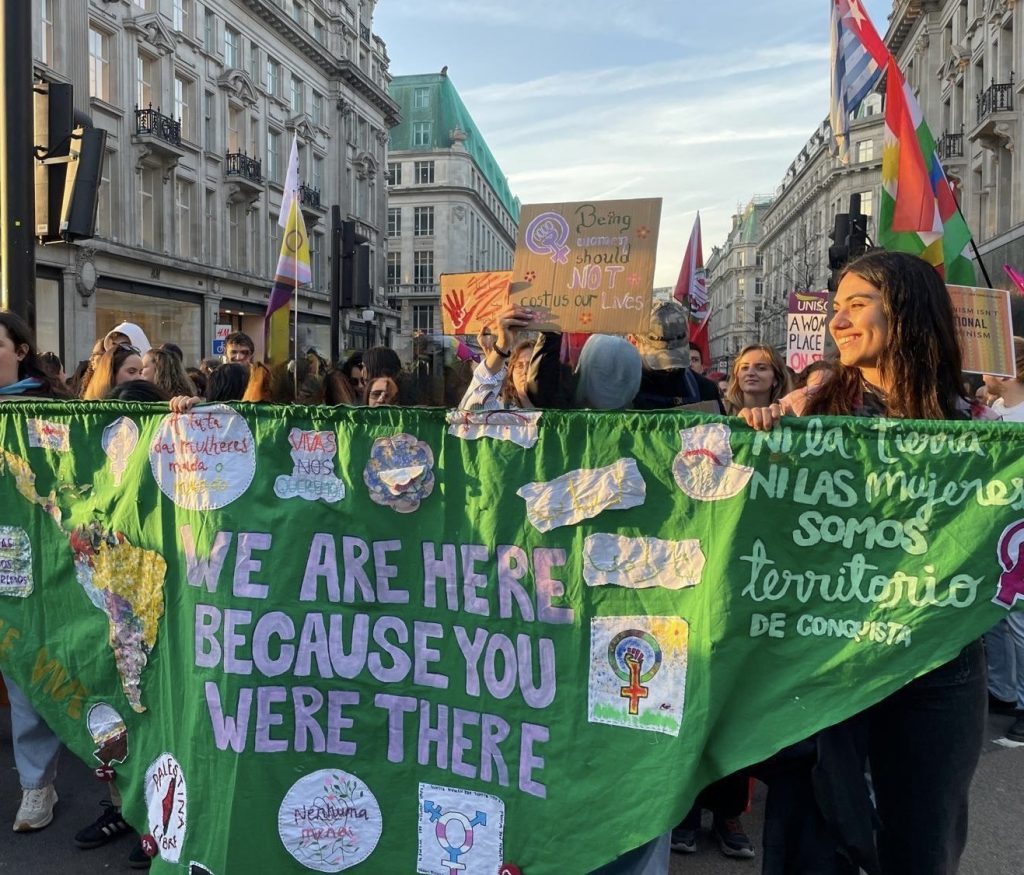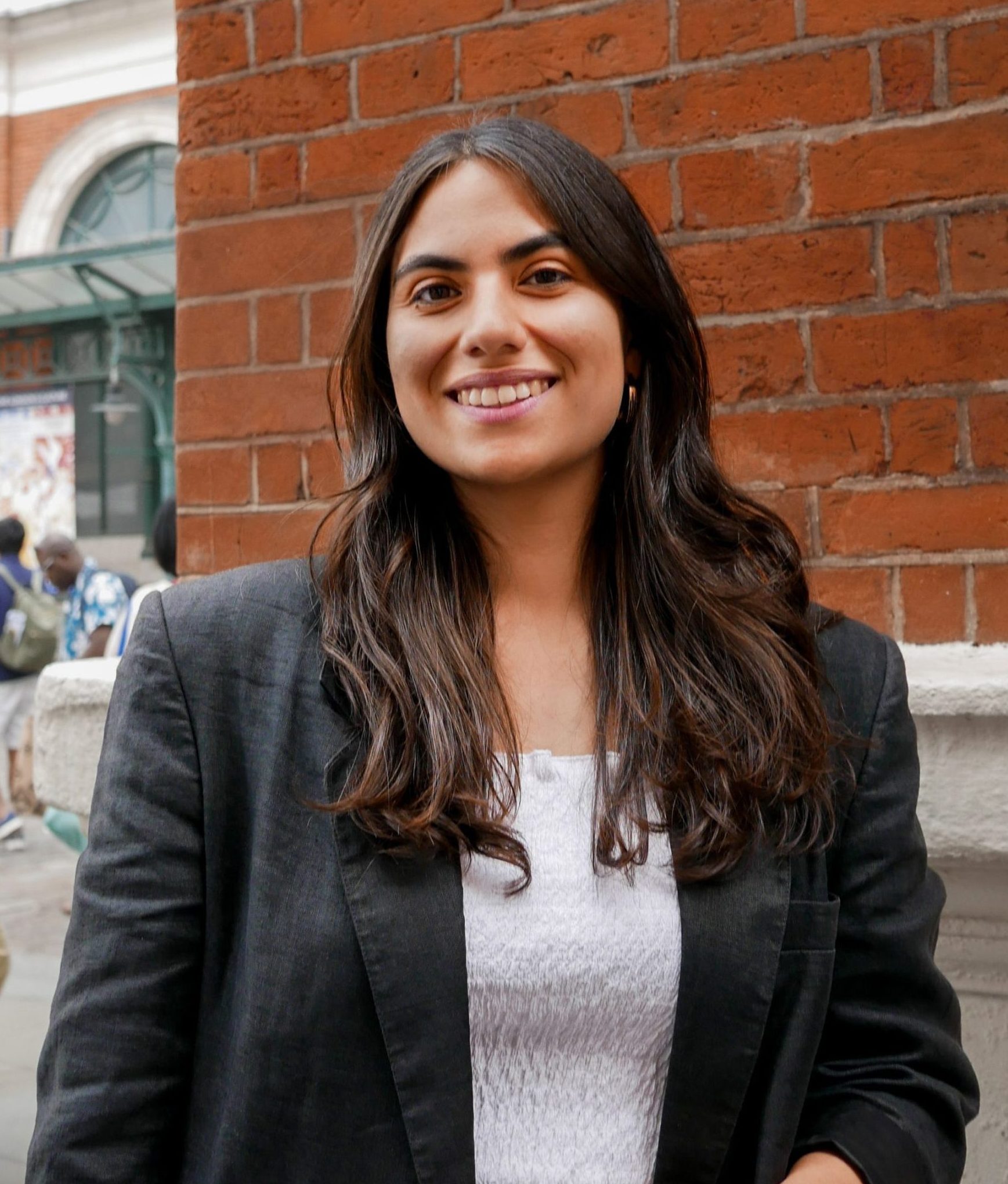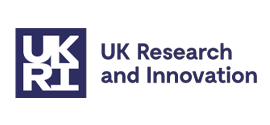
Photo: This photograph was taken during International Women’s Day March 2025 in London UK, where my organisation participated alongside other specialist organisations and grassroots groups. Copyright: Mayra Teck Ascurra
Domestic violence (DV) does not occur in a vacuum. As a frontline practitioner, I have first-hand experience with the various intersectional factors that perpetuate it and entrap migrant victims and survivors in abusive situations, including immigration status, institutional exclusion, language barriers, and cultural pressures. Culturally sensitive and specialist DV organisations in the UK work within this intersection to provide support that is centred around the lived experiences of survivors. In this blog, I offer some reflections from the front line, drawing from my work experience as a Violence Against Women and Girls (VAWG) practitioner within a leading Latin American ‘by-and-for’ organisation that provides support to Latin American, Black and minoritised survivors and victims in the UK context. ‘By-and-for’ organisations are community-driven initiatives established to address the needs of members from the same communities they represent. These organisations typically integrate culturally responsive and contextually informed practices into their service delivery.
As a Peruvian-Belgian migrant woman, my personal background is pivotal to my role in such an organisation. Having grown up in Peru, Malawi, Cameroon, Spain, and the UK, I bring lived experience of the emotional, social, and structural challenges that come with resettlement and integration. These experiences have shaped my deep understanding of the complex realities faced by many of the services users I support. Specifically, my fluency in Spanish and a shared Latin American background have been essential in building trust and rapport with Latin American victims and survivors that would otherwise be difficult to attain. This cultural and linguistic connection has been instrumental in fostering a more meaningful and cohesive engagement between survivors and the service, helping create a space where individuals feel seen and understood.
In my role, I provide culturally sensitive and trauma-informed advice, support, and advocacy for victims and survivors that align with their experiences, challenges, and cultural perspectives as migrant women. With most service users being from Latin America (including Central America and the Caribbean), I have witnessed the multifaceted obstacles they face in their journeys, from the point of crisis to finding safety, and to re-establishing their lives in the host society. In the increasingly politicised and exclusive landscape of the UK immigration system, these obstacles include access to safe housing, legal protections, interactions with the criminal justice system, and systemic language barriers. For migrant survivors and their children, these factors don’t exist in isolation; they compound, creating multiple layers of vulnerability that profoundly shape their lived experiences of violence and the pathways available to them to seek safety and support.
Barriers to migrant survivors of domestic violence
One of the main barriers affecting migrant survivors of DV in the UK is the condition of No Recourse to Public Funds (NRPF), a restriction placed on many migrants with temporary or limited immigration status. Under NRPF, survivors are denied access to public funds, such as essential welfare entitlements like Universal Credit, housing benefit and homelessness assistance from local authorities. In practice, this condition often forces women to remain in abusive situations through fear of destitution or detention and undermines their ability to disclose abuse and escape violence. According to the Domestic Abuse Commissioner’s Safety Before Status report (December 2022), an estimated 32,000 migrant survivors of domestic abuse in England and Wales are unable to access vital support each year due to having NRPF, with approximately 7,700 of them needing refuge or other safe accommodation.
This immigration-based exclusion often operates alongside immigration abuse, a form of coercive control wherein perpetrators ‘weaponise’ a woman’s immigration status. This refers to the deliberate use of a woman’s immigration status by perpetrators as a tool of coercive control, manipulating her insecure legal status or dependence to exert control through intimidation, isolation, or restriction of her autonomy. From my experience in the UK context, migrant men tend to obtain independent visas before women, which fuels a relationship of dependency that can be exploited. This creates a system of entrapment that is very difficult to break free from.
According to the Domestic Abuse Commissioner’s Safety Before Status report (December 2022), an estimated 32,000 migrant survivors of domestic abuse in England and Wales are unable to access vital support each year due to having No Recourse to Public Funds (NRPF), with approximately 7,700 of them needing refuge or other safe accommodation.
‘By-and-for’ organisations – which remain critically under-funded and under-recognised in the UK – understand the needs of their communities and are therefore in a unique position to provide effective support for victims and survivors in this situation. This includes specialist advice for addressing the intersecting challenges of immigration and DV, as well as culturally sensitive advocacy and emotional therapy through counselling that is linguistically accessible. This holistic approach offers Black and minoritised migrant survivors and victims more effective pathways to navigate the complex and structurally exclusionary immigration system to be able to flee abusive situations. By implementing not only DV support but other person-centred advocacy that responds to survivors’ lived experiences and personal immigration journeys, the former are supported in a way that consolidates their agency.
More funding is essential for such specialist organisations to grow in their capacity and strengthen partnerships with other grassroots organisations, ‘by-and-for’ organisations, statutory services, and local councils to ensure knowledge is shared, referral pathways are strengthened, and that no victim or survivor falls through the gaps. As well as this, rich ethnographic research is needed to highlight the heterogeneous needs of minoritised migrant women in the UK and elsewhere to inform advocacy for change at the policy level such that the institutional challenges faced by these women – such as the NRPF conditions presented here – and the dangers they impose are effectively addressed.
Specialised and culturally specific organisations play a vital role by offering support that is linguistically appropriate, culturally sensitive, and tailored to the social realities of the communities they serve, ensuring that survivors remain at the centre of their work.
About the author

Mayra Teck Ascurra is a Research Associate at the Institute of Domestic Violence, Religion & Migration. Born in Lima and based in London, Mayra brings a global perspective shaped by her personal experience of migration and is currently a Violence Against Women and Girls (VAWG) practitioner for a leading Latin American gender-based violence non-governmental organisation in the UK. Motivated by providing a culturally appropriate response to VAWG, she provides trauma-informed and linguistically accessible support, advocacy, and advice for Latin American, Black and Minoritised victims and survivors. Mayra’s primary focus concerns the intersection of gender, violence, and sexual and reproductive health, with an emphasis on how these issues are shaped by and interact within social and cultural contexts.
Disclaimer: Opinions expressed by authors contributing to our blog are those solely of the authors and do not necessarily represent the position of IDVRM, its Director or other team members. IDVRM is comprised of diverse individuals who are encouraged to share their experiences and opinions openly with recognition that other team members may have different experiences and positions. IDVRM does not claim to represent any one community and we understand that belonging to a specific group does not entitle any one of us to speak for all.
